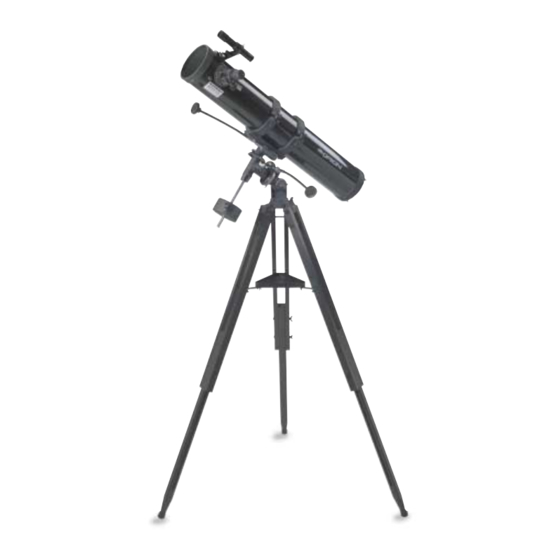Table of Contents
Advertisement
Quick Links
Advertisement
Table of Contents

Summary of Contents for ORION TELESCOPES & BINOCULARS SpaceProbe 4.5" EQ 9036
- Page 1 INSTRUCTION MANUAL Orion ® SpaceProbe 4.5" EQ ™ #9036 Equatorial Reflecting Telescope Customer Support (800) 676-1343 E-mail: support@telescope.com Corporate Offices (831) 763-7000 P.O. Box 1815, Santa Cruz, CA 95061 Providing Exceptional Consumer Optical Products Since 1975 IN 081 0998...
- Page 2 Finder scope Secondary mirror and three-vane spider Finder scope alignment screws (inside tube) Finder scope bracket Spider vane Eyepiece thumbscrew Tube Rings Focuser Primary mirror cell Focus knob Declination slow- motion control Declination lock knob Declination (Dec.) setting circle Counterweight shaft Collimation screws (3) Counterweight Right ascension...
-
Page 3: Table Of Contents
ongratulations on your purchase of a quality Orion telescope! Your new SpaceProbe 4.5" EQ Reflector is designed for high-resolution viewing of astronomical objects. With its precision optics and equatorial mount, you’ll be able to locate and enjoy hundreds of fascinating celestial denizens, includ- ing the planets, Moon, and a variety of deep-sky galaxies, nebulas, and star clusters. -
Page 4: Balancing The Telescope
1. Lay the equatorial mount on its side. Attach the tripod legs, mirror. Holding the bar with one hand, remove the two nuts one at a time, to the base of the mount by sliding the tripod leg with the other and install the bracket, then replace the nuts. bolt into the slot in the mount and lightly tightening the wing 12.Lastly, install the finder scope in the bracket. -
Page 5: Aligning The Finder Scope
4. Aligning the Finder Scope To find Polaris in the sky, look north and locate the pattern of the Big Dipper (Figure 2, see pg. 10). The two stars at the end of the “bowl” of the Big Dipper point right to Polaris. A finder scope has a wide field of view to facilitate the loca- tion of objects for subsequent viewing through the main Observers in the Southern Hemisphere aren’t so fortunate to... -
Page 6: Collimating The Optics
Understanding the Setting Circles you close, assuming the equatorial mount is accurately polar- aligned. The R.A. setting circle must be recalibrated every time The setting circles on an equatorial mount enable you to you wish to locate a new object. Do so by calibrating the setting locate celestial objects by their “celestial coordinates.”... -
Page 7: Using The Telescope-Astronomical Observing
secondary mirror (and your eye) centered in the reflection of the mirror cell in place. Adjusting the tilt requires a “push-pull” the primary mirror, as is Figure 3D (see pg. 11 for figures 3A-D). technique involving adjustment of one collimation thumb- If anything is off-center, follow the collimation procedure below. - Page 8 a half-hour for your telescope to cool to the temperature out- looked at the object with it, you can try switching to a higher- doors. In very cold climates (below freezing), it is essential to power eyepiece to ferret out more detail, if atmospheric store the telescope as cold as possible.
-
Page 9: Care And Maintenance
horizon at the time you plan to observe. A simple planisphere, from the morning or evening horizon. No surface markings can be or star wheel, can be a valuable tool both for learning the con- seen on Venus, which is always shrouded in dense clouds. stellations and for determining which ones are visible on a MARS If atmospheric conditions are good, you may be able given night at a given time. -
Page 10: Specifications
used to clean the exposed lenses of your eyepieces or finder cell—it has been secured in place by both clamps and adhe- scope. Never use regular glass cleaner or cleaning fluid sive. Be careful not to touch the front surface of the mirror with designed for eyeglasses. - Page 11 Figure 3A. The view down the focuser tube of a Newtonian reflector with eyepiece removed. In this example, the optical system is badly out of collimation. Figure 3B. Secondary mirror centered Figure 3C. Secondary mirror correctly Figure 3D. Primary mirror correctly under focuser tube, viewed through the aligned (tilted).
- Page 12 One-Year Limited Warranty This Orion SpaceProbe 4.5" EQ Reflector is warranted against defects in materials or work- manship for a period of one year from the date of purchase. This warranty is for the benefit of the original retail purchaser only. During this warranty period Orion Telescopes & Binoculars will repair or replace, at Orion’s option, any warranted instrument that proves to be defective, pro- vided it is returned postage paid to: Orion Warranty Repair, 89 Hangar Way, Watsonville, CA 95076.
















Need help?
Do you have a question about the SpaceProbe 4.5" EQ 9036 and is the answer not in the manual?
Questions and answers